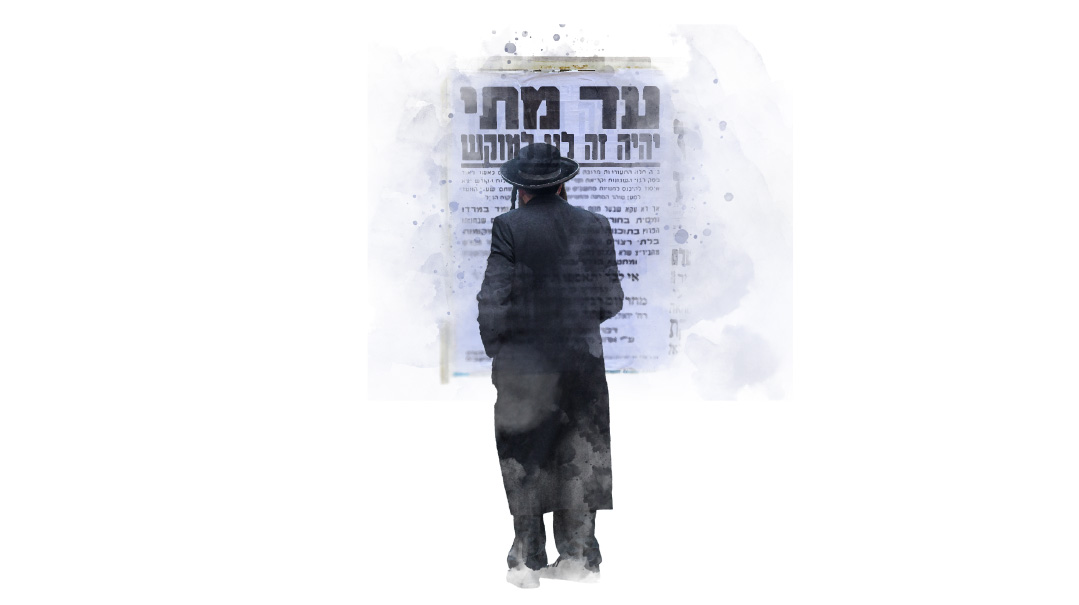No One Mumbles “Remember Us unto Life”

This has happened to me before, my imaginings while sitting in an empty shul. And it is happening again this year on the day after Yom Kippur, but with somewhat different outcomes.
It is three in the afternoon, and I am in the same shul, in the same seat where I spent the entire Yom Kippur day. I have come into the shul today to do a little Mishnah study. Yesterday this room was packed with hundreds of worshipers. Today it is empty. Yesterday, the shul resounded with the passionate cries of men and women striving to achieve a renewed connection and closeness to Him, begging for a year of life, asking for forgiveness, “Selach lanu, mechal lanu, kaper lanu.” Today, a hush envelops the room which yesterday reverberated with “Al tashlicheinu milfanecha, Cast us not off before Thee.”
Where did all the people go? Clearly, they are busy with preparations for Succos: lulav and esrog must be procured, succahs have to be built, sechach must be prepared. The few days between Yom Kippur and Succos are occupied with implementing the spirituality of Yom Kippur through the physicality of Succos.
As I sit here in the soundless shul, I wonder: Did every syllable of yesterday’s fervent prayers reach the Heavenly Throne? Did any of those words remain trapped here, unable to break out from their earthly bonds? I have had this feeling before, and perhaps I am hallucinating and imagining, but once again I think I hear a whisper, a flutter of sound. Could these be the muffled remnants of prayer swirling around me, cleaving to the walls of the room, yearning to break out from the gravity that prevents them from rising up? Could that gravity be due to robotic, perfunctory reading of lifeless words? Such words remain forever moored to earth, unable to move upward.
But it cannot be that searing words like “who shall live and who shall die” were uttered without feeling and without emotion. Perhaps there were other words and phrases — familiar ones that are uttered every single day of the year — that were thoughtlessly mumbled yesterday: the well-trodden words from the hallelujah psalms, the Pesukei D’zimra, the Ashrei — all the familiar phrases that mark the daily davening.
Are these the muted sounds I am hearing now? In all the passion of Yom Kippur, were these somehow left behind? That would be fully understandable. “Zachreinu l’chayim… Remember us for life, O King Who desires life” is much more likely to ignite emotions than the daily hallelujah praises. In the competition for our attention, what can compete with “Kesav l’chayim tovim… Inscribe for a good life all the children of Thy covenant.”
And yet, although it takes rigorous concentration to utter the identical daily words with passion and conviction, it is obvious that every word of prayer is significant. Certainly those prayers that we recite only once a year are no more crucial than those that daily praise the greatness of the Creator. Kol Nidrei, for example, which is recited for a few moments at the beginning of Yom Kippur, has captured the hearts and souls of Jews everywhere, while the Ashrei of Psalm 145, recited three times a day every single day of the year, is often mumbled and taken for granted. But is it not reasonable that a prayer that the Sages established on a thrice-daily basis should possess more gravitas than a once-yearly paragraph? But those are the facts of human nature: frequency and thoughtlessness are twin brothers. And no one — not even retired rabbis who write for Mishpacha magazine —is completely immune to such mindless mouthings.
A suggested resolution for the new year: to concentrate and give special attention to that which we encounter daily and routinely — whether it be daily prayer or daily human beings. Not to allow daily prayer or daily people to become routine and habitual, but instead to look with fresh eyes at the familiar and the everyday, and to transform them into something new and original.
Those muffled murmurs trapped within the shul: Was I hallucinating? Perhaps. But words of prayer that occasionally do not reach their destination because of their very familiarity — and familiar people who receive no recognition because of their very familiarity — such phenomena could very well be real.
(Originally featured in Mishpacha, Issue 730)
Oops! We could not locate your form.






